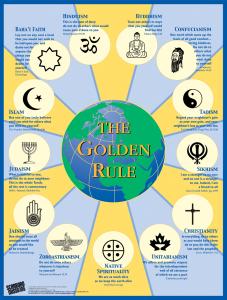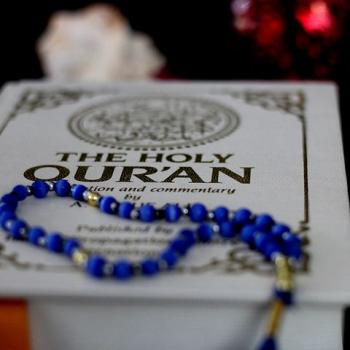 A while back I published a post on the Golden Rule. But is the Golden Rule the panacea of the best human interaction? Does the Platinum Rule, attributed to Dave Kerpen, trumps the Golden Rule? To that I may ask, does the ‘Diamond Rule’ trump both of them?
A while back I published a post on the Golden Rule. But is the Golden Rule the panacea of the best human interaction? Does the Platinum Rule, attributed to Dave Kerpen, trumps the Golden Rule? To that I may ask, does the ‘Diamond Rule’ trump both of them?
The Golden Rule basically states that you should treat others like you want others to treat you.
It implies the basic assumption that other people would like to be treated the way you would like to be treated.
The Platinum Rule is attributed to Dave Kerpen, a NY Times bestseller and a serial entrepreneur, and simply states that you should treat others the way THEY like to be treated.
 The Golden Rule
The Golden Rule
The Golden Rule of conduct was coined in Britain in the seventeenth century. However, many variations have been known in ancient Egypt, India, China and other civilizations as well.
The Golden Rule: Christian version
Though not called golden rule in the Gospels, the following passages represent what later has come to be known as the Golden Rule.
In everything, therefore, treat people the same way you want them to treat you, for this is the Law and the Prophets. Matthew 7:12
Do to others as you would like them to do to you. Luke 6-31
In fact, ‘love thy neighbor’ is second only in importance after loving God Almighty. In other words, a true Christian who loves God would not hate his neighbor.
And he said to him, “You shall love the Lord your God with all your heart and with all your soul and with all your mind. This is the great and first commandment. And a second is like it: You shall love your neighbor as yourself. Matthews 22: 37-39
The Golden Rule: Jewish version
Jesus had actually quoted the Old Testament to refer to the Golden Rule.
Love your neighbor as yourself. I am the Lord. Leviticus 19:18
Hillel, a famous Jewish sage was asked to summarize the Torah while he stood on one foot. He responded by re-stating the Golden Rule:
That which is harmful to you, do not do to your fellow. This is the whole Torah. The rest is the explanation (commentary). Go and learn. Talmud, Shabbat 31a
Torah’s views on Immigrants
The following passage can be seen as one application of the golden rule.
Do not take advantage of foreigners who live among you in your land. Treat them like native-born Israelites, and love them as you love yourself. Remember that you were once foreigners living in the land of Egypt. I am the Lord your God. Leviticus 19:33-34
The Golden Rule: Islamic version
Not one of you truly believes until you wish for your brother (others) what you wish for yourself. Hadith of prophet Muhammad- An-Nawawi’s Forty Hadith 13 (p. 56)
The following narrations combine the “positive” and the “negative” version of the golden rule.
A Bedouin came to the prophet, grabbed the stirrup of his camel and said: O the messenger of God! Teach me something to go to heaven with it. Prophet said: “As you would have people do to you, do to them; and what you dislike to be done to you, don’t do to them. Now let the stirrup go! [This maxim is enough for you; go and act in accordance with it!]” Kitab al Kafi vol. 2, p. 146
The Platinum Rule
Dave Kerpen, author of the book The Art of People, states that the Golden Rule is a splendid concept except for one thing: Everyone is different, and the truth is that in many cases what you’d want done to you is different from what your partner, employee, customer, investor, wife, or child would want done to him or her. So Kerpen came up with the Platinum Rule: Do unto others as they would want done to them. Says Kerpen, “The Golden Rule, as great as it is, has limitations, since all people and all situations are different. When you follow the Platinum Rule, however, you can be sure you’re actually doing what the other person wants done and assure yourself of a better outcome.”[1]
But I see some problems with the Platinum Rule. What if how others want to be treated is harmful for them? And how do you know how others want to be treated?
 The Diamond Rule
The Diamond Rule
So I came up with the Diamond Rule. The idea came to my mind after hearing a Friday sermon at the local mosque when the Imam was talking about various stages of best behavior, without mentioning any of the ‘rules’.
So here is my Diamond rule: how about treating others the way YOU want God to treat YOU? The most often-mentioned attributes of God in the Qur’an are Ar Rehmaan (Most Kind/Beneficient) and Ar Raheem (Most Merciful). So why not treat each other with kindness and mercy that we expect from God for ourselves?
We want God to forgive us when we make a mistake, don’t we?
We want God to be kind to us no matter how we behave, don’t we?
We want God to show mercy to us, even if we are not merciful to others don’t we?
We want God to help us when we most need it, don’t we?
We want God to heal us when we are ill, don’t we?
And if we follow the golden rule of our own faith traditions, it would be safe to assume:
We would be kind to others.
We would not be rude to others.
We would help others in time of need.
We would welcome guests- to our homes, neighborhood and our country.
We would thank others for the good things they do- at work, at home and everywhere else.
We won’t bad mouth and defame others.
We won’t spread hate against others.
We won’t hurt others.
We won’t oppress others.
We won’t kill others, hurt their children or sexually assault and harass women (and men).
The list can go on and on…
I had asked this question at the end of my post on the golden Rule:
How ready are we to adopt the golden rule in our daily life?
And I am going to ask another question now, related to the ‘Diamond Rule’:
How ready are to we to treat others like the way we want God to treat us?
[1] https://www.inc.com/peter-economy/how-the-platinum-rule-trumps-the-golden-rule-every-time.html












